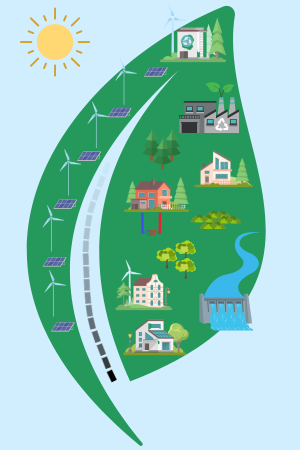
SOLAR POWER
Sunshine, powering homes
ENERGY PRODUCTION
As global energy needs continue to escalate, and environmental concerns become more urgent, transitioning to renewable energy sources is paramount.
Solar power, with its virtually infinite supply and zero emission technology, stands as an immensely attractive alternative.
SOLAR POWER
Homeowners, in particular, are progressively adopting solar power as an efficient and sustainable energy solution.
Solar power, as the name suggests, is harnessed from the sun's energy, converted into electricity via solar panels.
A typical home solar power setup comprises photovoltaic (PV) solar panels, an inverter to convert the power from DC to AC, and a metering system for monitoring power production and consumption.
One of the primary reasons homeowners are turning to solar power is its potential for significant savings. After the initial investment, which has been steadily decreasing over the years due to technological advances, solar power can drastically cut electricity bills. In some cases, where production exceeds consumption, homeowners can even earn by selling the surplus back to the grid.
In addition to its economic benefits, solar power significantly reduces the environmental impact. Traditional electricity is often sourced from fossil fuels, the burning of which emits harmful greenhouse gases. In contrast, solar power is a clean, renewable energy source that emits no pollution, helping to combat climate change and reduce our collective carbon footprint.
For those living in off-grid or remote locations, solar power provides a reliable, self-sufficient power source. Unlike grid-dependent electricity, solar power systems can provide uninterrupted power supply, ensuring energy independence and security.
However, there are also considerations that potential adopters of home solar power should bear in mind. The installation of solar panels requires significant upfront costs, though these are offset over time through reduced electricity bills and potential government incentives. Additionally, solar power is inherently dependent on sunlight, which can be unpredictable or limited in some regions.
Furthermore, solar panels require a substantial amount of space for installation, which might not be available for all homeowners. Also, not all rooftops are suitable for solar panel installation due to their orientation, angle, or structural stability. It's also worth noting that while solar panels require relatively low maintenance, they do not last forever. The performance of panels can decrease over time, and they may need to be replaced after 25-30 years.
Nevertheless, with the advancement in solar technology, including more efficient panels, battery storage solutions, and the growing popularity of community solar projects, the potential drawbacks are being addressed steadily.
To maximize the benefits of solar power at home, it's crucial to conduct a comprehensive evaluation of your home's suitability, your energy needs, and financial considerations. Understanding local regulations and available incentives can also greatly assist in decision-making.
In conclusion, while solar power may not be the perfect solution for all, it undoubtedly offers numerous benefits, both to individual homeowners and our planet. By harnessing the sun's abundant energy, we can illuminate our homes, reduce our environmental impact, and take a significant step towards a sustainable and energy-secure future.
Solar Power Installation Process
Assessment
Our professionals will conduct a site assessment to check the condition of your roof, its orientation, shading issues, and the best location for the panels.
Based on the assessment, the installer will propose a solar panel system that suits your energy needs, budget, and property specifics.
At this point we can discuss finance options for your project.
Installation
The team will then install the racking system to hold the panels, place the panels on the racks, and secure them in place.
They'll also set up the inverter, which converts solar energy into electricity usable in the home.
All the panels will be connected to the inverter and then to your home's electrical system.
Activation
After installation, the system will need to be inspected by local authorities to ensure it meets regulatory standards and is safe to operate.
Once everything is approved, your solar installer will activate your solar panel system, and it will start generating electricity.
Periodic cleaning and professional inspections can help maintain system efficiency and lifespan.

